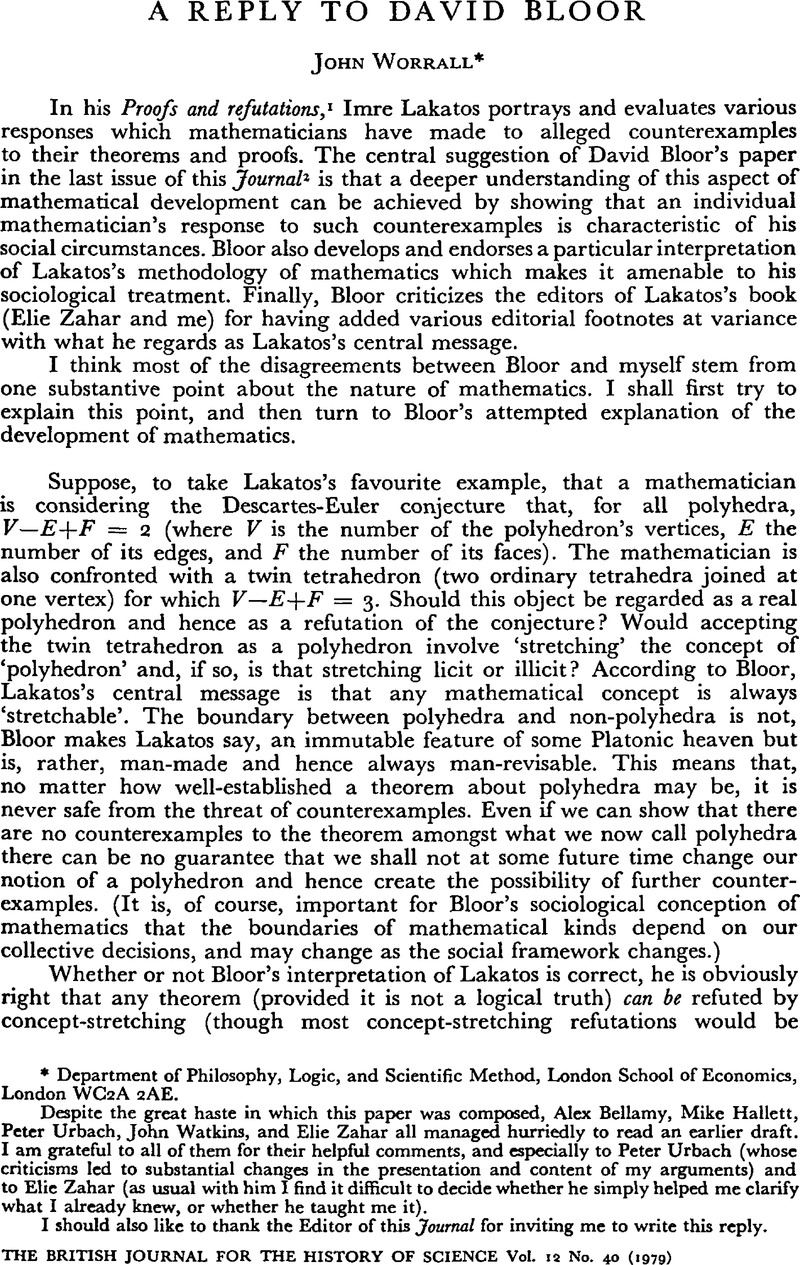Published online by Cambridge University Press: 05 January 2009

Despite the great haste in which this paper was composed, Alex Bellamy, Mike Hallett, Peter Urbach, John Watkins, and Elie Zahar all managed hurriedly to read an earlier draft. I am grateful to all of them for their helpful comments, and especially to Peter Urbach (whose criticisms led to substantial changes in the presentation and content of my arguments) and to Elie Zahar (as usual with him I find it difficult to decide whether he simply helped me clarify what I already knew, or whether he taught me it).
I should also like to thank the Editor of this Journal for inviting me to write this reply.
1 Lakatos, Imre, Proofs and refutations: the logic of mathematical discovery (edited by Worrall, John and Zahar, Elie), Cambridge, 1976.CrossRefGoogle Scholar
2 Bloor, David, ‘Polyhedra and the abominations of Leviticus’, The British journal for the history of science, 1978, 11, 245–72.CrossRefGoogle Scholar
3 Cauchy, A. L., ‘Recherches sur les polyèdres’, Journal de l'école polytechnique, 1813, p, 68–86.Google Scholar
4 Of course we may make slips in proof-checking, or our proof-checking machine may break down. But this sort of practical fallibility is not the issue. All the philosophers (Descartes, Hume, Kant, etc.) who argued that arithmetic, for example, is apodeictic, admitted of course that we may make occasional slips in computation.
5 Lakatos, , op. cit. (1), pp. 121–3.Google Scholar
6 On this problem see especially Lakatos, 's ‘A renaissance of empiricism in the recent philosophy of mathematics?’, now reprinted in his Mathematics, sciente and epistemology; Philosophical papers, Vol. ii, Cambridge, 1978.CrossRefGoogle Scholar
7 Poincaré was right that absolute rigour of proof has now been attained. Lakatos's pupils giggled at this remark (see Bloor, , op. cit. (2), p. 269)Google Scholar because they misinterpreted it as meaning that mathematics (i.e. the set of mathematical theorems) is now absolutely fixed.
8 Bloor, , op. cit. (2), p. 270.Google Scholar For the ‘group’ concept see below p. 75.
9 Ibid., p. 269.
10 Lakatos, , op. cit. (1), pp. 125–6.Google Scholar
11 Moreover, Bloor's correct observation that ‘no principle of an absolute kind’ (op. cit. (2), p. 268)Google Scholar separates logical and descriptive terms should not be taken to entail that we have no good reasons for regarding our logical terms as ‘truly’ logical; (see, e.g., Quine, W. V., Philosophy of logic, Englewood Cliffs, 1970).Google Scholar
12 Bloor, , op. cit. (2), p. 268.Google Scholar
13 For further developments of Lakatos's idea of appraising axiom systems see Hallett, Mike, ‘Towards a methodology of mathematical research programmes’, The British journal for the philosophy of scienceGoogle Scholar, forthcoming.
14 Bloor, , op. cit. (2), p. 245Google Scholar; emphasis supplied.
15 Ibid.
16 Douglas, Mary, Natural symbols: explorations in cosmology, Harmondsworth, 1973.Google Scholar
17 Take, e.g., Bloor's attempt to justify the connexion of monster-barring with pollution-conscious societies. This seems, to my untutored eye, to start from a non sequitur. (Bloor infers from the very plausible premise that men will try to legitimate their social conventions by claiming that they are based in nature to the implausible conclusion that this socializes nature— ‘Nature becomes a code for talking about society’ (op. cit. (2), p. 252).) Bloor's argument also seems to depend quite heavily on there being an emotional component to ‘monster-barring’, that it should involve ‘turning in disgust’ from alleged counter-examples. But of course this emotional component is by no means essential. (Bloor was perhaps misled by Lakatos's terminology: ‘monster’ is, of course, a technical term in biology.) Finally it just seems grossly implausible that a genius like Poincaré, who was engaged in critical and immensely fruitful debates on a variety of subjects with a variety of scientists, should have been simply reflecting his social circumstances in responding to polyhedra. (Bloor does not differentiate those cases in which ‘monster-barring’ would seem justified—say someone proposed a sphere as a refutation of the Descartes-Euler conjecture—from these cases in which it seems definitely obfuscatory. Surely this makes a difference to the sociological explanation.)
18 Bloor, , op. cit. (2), p. 245.Google Scholar
19 Poincaré, Henri, The value of science, 1913, reprinted New York, 1958, p. 16.Google Scholar
20 Bloor, , op. cit. (2), p. 261.Google Scholar
21 Ibid., p. 266.
22 Ibid., p. 261.
23 Ibid.
24 I am assuming that Bloor himself would not count his ‘explanation’ of the (Bavarian) Seidel's achievements in terms of (Prussian) social factors as an explanatory success as it stands.
25 Ibid., pp. 248–9.
26 Ibid., p. 246.
27 Ibid.